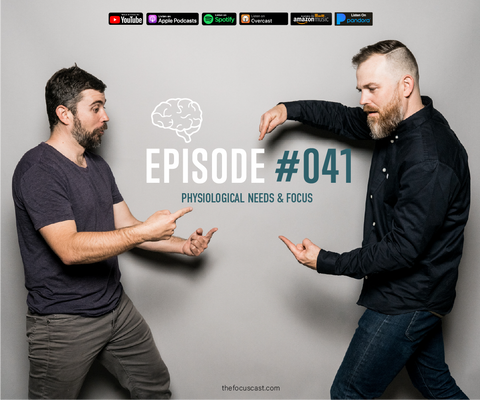
#41 Physiological Needs & Focus
Why do we dream? What are we running from and what are we running to? Why… what we have is never enough? Why do we try to impress people around us? Why do we want a nice car? Why do we save money? Why do we eat an excess of fatty foods? All these “needs” greatly influence what consumes our mind and our focus. In this series we are talking about the needs that consume our mind, and today we are starting with our most basic needs: our physiological needs. Let’s dig in…
00:00 Intro to physiological needs & focus
00:49 Intro to podcast
02:10 Problem with how our physiological effect focus
09:54 Solution to increasing our focus
LISTEN
PROBLEM
The brain has its own type of memory storage (called working memory), and it is extremely limited in capacity. (Science direct) When we focus on anything for an extended period without breaks or distractions then we become tired and exhausted because our energy has been depleted during this time period.
Our brains are constantly consumed with ensuring our needs are met. Abraham Maslow (1908-1970) established Maslow's Hierarchy of Needs (Pyramid).
The pyramid can be broken down into two main categories: The first four levels are often referred to as deficiency needs (D-needs), and the top level is known as growth or being needs (B-needs).
Here is he breakdown: The brain struggles to focus on long-term goals without your basic needs being met. So what are the basic needs?
We start with our Physiological Needs: Breath, water, food, sleep, shelter, clothing, reproduction.
Example: if you are living paycheck to paycheck, which most Americans are (Around 64% of Americans, LendingClub survey.) So 64% of Americans are consumed with… will I have a job and be able to provide food, water and shelter for my family next month?
This doesn't include all the other deficiency needs fighting for attention in our minds which we will cover in the next 4 episodes.
While we often just “get in line” without questioning the line we are in, many of us are simply grinding daily in effort to meet and provide for our families' most basic needs.
SOLUTION
Be intentional about meeting your basic needs now and for the future. Start small:
1-3 month saved for rent/mortgage
1-3 month of food/water storage
Bryan talks about examples of food storage.
This will calm your mind consciously or subconsciously in assuring yourself that you have the ability to preserve your Physiological Needs for a specific time period.
Mediation is the practice of pulling you away from what your brain tells you to focus on and you telling your brain WHAT you want to focus on. These muscles help you focus on long-term.
Allocate (FORCE) time to focus on long-term goals:
Talk to your family about long term goals
Talk to a financial advisor
Talk to a personal coach or friend about long term goals
When you meet your most basic needs, acknowledge and be grateful.
I am eating a great meal for breakfast, and I am grateful that my needs are met today. I have groceries for a week and I am grateful that I can eat this week.
I paid my rent/mortgage this month and I am grateful that I have shelter this month.
This allows your brain to have confidence that those basic needs are met, and gives you permission to focus on long-term goals.
FIND US ON
https://formsandfocus.com/
https://www.instagram.com/formsandfocus/
https://www.tiktok.com/@formsandfocus
#focus #dream #physiologicalneeds

Comments (0)
There are no comments for this article. Be the first one to leave a message!